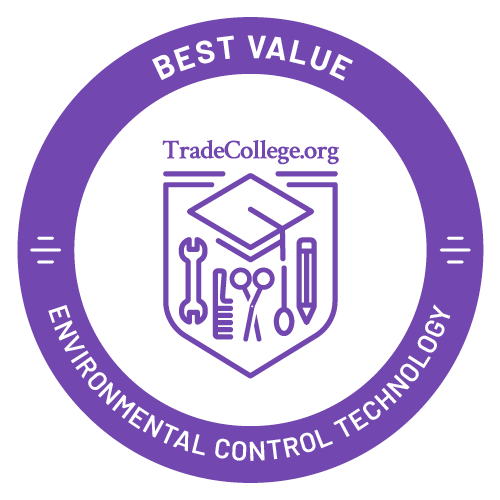Find Trade Colleges
2023 Best Value Environmental Control Technology Bachelor's Degree Schools in the Southeast Region
Identifying Quality Schools at More Affordable Prices
Finding the Best Environmental Control Technology Bachelor's Degree School for You
Environmental Control Technology is the #22 most popular major in the country with 9,376 degrees and certificates awarded in 2021-2022.
There are lots of options to pick from today when trying to decide which trade school program is right for you. You can choose a traditional brick and mortar school, or with the growth of online education, you can attend a school half-way across the country without even leaving your house.
Along with in-depth profiles of schools and the programs they offer, Trade College Search has created the Best Value Environmental Control Technology Bachelor's Degree Schools in the Southeast Region to help you in your search for the best school for you. Our analysis looked at 2 schools in the Southeast Region to see which bachelor's degree programs offered the best value experiences for environmental control tech students with the aim of identifying those quality schools that are more affordable than some of their counterparts.
When determining this ranking, we place a high emphasis on the school's quality as well as its sticker price. Even though a college may be affordable, it may not offer value. More specifically, we discount our quality score by the published tuition and fees charged by a school. This gives the cost per unit of quality for each college. The value is determined by how much quality your dollar buys.
Our calculations use out-of-state tuition and fees in our nationwide and regional rankings. Average in-state tuition and fees are used for our statewide rankings.
Featured schools near , edit
2023 Best Value Environmental Control Technology Bachelor’s Degree Schools in the Southeast Region
Check out the environmental control tech bachelor's degree programs at these schools if you want to get the best value for your educational dollar.
Best Southeast Region Schools for Affordable Quality for a Bachelor's in Environmental Control Technology
Our analysis found North Carolina State University to be the best value school for environmental control technology students who want to pursue a bachelor’s degree in the Southeast Region . Located in the large city of Raleigh, NC State is a public school with a very large student population.
Out-of-state tuition fees for undergraduate students at NC State are $30,869 per year. Environmental Control Tech majors at NC State take out an average of $20,094 in student loans while working on their Bachelor's Degree.
Out of the 2 schools in the Southeast Region that were part of this year’s ranking, Appalachian State University landed the # 2 spot on the list. Appalachian State is a fairly large public school located in the distant town of Boone.
Out-of-state tuition fees for undergraduate students at Appalachian State are $23,454 per year. On average, environmental control tech graduates from Appalachian State take out $20,157 in student loans while working on their Bachelor's Degree. This translates to an average monthly loan payment of $233, based on a 10-year repayment plan.
Read full report on Environmental Control Technology at Appalachian State University
Best Environmental Control Technology Colleges by State
Explore the best environmental control technology colleges for a specific state in the Southeast region.
| State | Degrees Awarded |
|---|---|
| Georgia | 172 |
| South Carolina | 14 |
| Arkansas | 0 |
| North Carolina | 124 |
| Florida | 1,395 |
| West Virginia | 2 |
| Louisiana | 44 |
| Virginia | 24 |
| Alabama | 221 |
| Kentucky | 31 |
| Tennessee | 17 |
| Mississippi | 129 |
Environmental Control Technology Related Majors for Environmental Control Tech
One of 18 majors within the trade school area of study, environmental control technology has other similar majors worth exploring.
Environmental Control Tech Focus Areas
Most Popular Related Majors
| Related Major | Annual Graduates |
|---|---|
| Industrial Production Technology | 11,288 |
| Electromechanical Engineering Technology | 10,780 |
| Drafting & Design Engineering Technology | 8,822 |
| Electronics Engineering Technology | 8,347 |
| Engineering-Related Fields | 6,553 |
Notes and References
*These averages are for the top 2 schools only.
- The Integrated Postsecondary Education Data System (IPEDS) from the National Center for Education Statistics (NCES), a branch of the U.S. Department of Education (DOE) serves as the core of the rest of our data about colleges.
- Some other college data, including much of the graduate earnings data, comes from the U.S. Department of Education’s (College Scorecard).
More about our data sources and methodologies.



